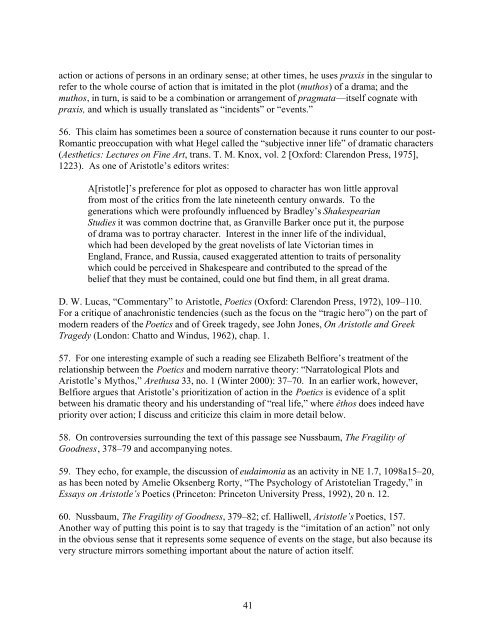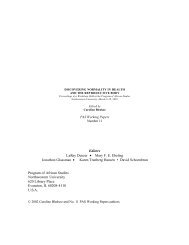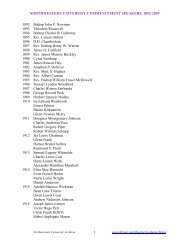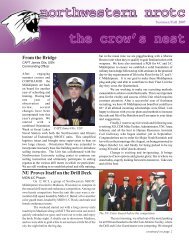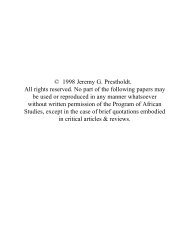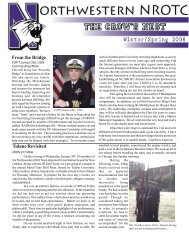TRAGIC RECOGNITION: ACTION AND IDENTITY IN ANTIGONE ...
TRAGIC RECOGNITION: ACTION AND IDENTITY IN ANTIGONE ...
TRAGIC RECOGNITION: ACTION AND IDENTITY IN ANTIGONE ...
You also want an ePaper? Increase the reach of your titles
YUMPU automatically turns print PDFs into web optimized ePapers that Google loves.
action or actions of persons in an ordinary sense; at other times, he uses praxis in the singular to<br />
refer to the whole course of action that is imitated in the plot (muthos) of a drama; and the<br />
muthos, in turn, is said to be a combination or arrangement of pragmata—itself cognate with<br />
praxis, and which is usually translated as “incidents” or “events.”<br />
56. This claim has sometimes been a source of consternation because it runs counter to our post-<br />
Romantic preoccupation with what Hegel called the “subjective inner life” of dramatic characters<br />
(Aesthetics: Lectures on Fine Art, trans. T. M. Knox, vol. 2 [Oxford: Clarendon Press, 1975],<br />
1223). As one of Aristotle’s editors writes:<br />
A[ristotle]’s preference for plot as opposed to character has won little approval<br />
from most of the critics from the late nineteenth century onwards. To the<br />
generations which were profoundly influenced by Bradley’s Shakespearian<br />
Studies it was common doctrine that, as Granville Barker once put it, the purpose<br />
of drama was to portray character. Interest in the inner life of the individual,<br />
which had been developed by the great novelists of late Victorian times in<br />
England, France, and Russia, caused exaggerated attention to traits of personality<br />
which could be perceived in Shakespeare and contributed to the spread of the<br />
belief that they must be contained, could one but find them, in all great drama.<br />
D. W. Lucas, “Commentary” to Aristotle, Poetics (Oxford: Clarendon Press, 1972), 109–110.<br />
For a critique of anachronistic tendencies (such as the focus on the “tragic hero”) on the part of<br />
modern readers of the Poetics and of Greek tragedy, see John Jones, On Aristotle and Greek<br />
Tragedy (London: Chatto and Windus, 1962), chap. 1.<br />
57. For one interesting example of such a reading see Elizabeth Belfiore’s treatment of the<br />
relationship between the Poetics and modern narrative theory: “Narratological Plots and<br />
Aristotle’s Mythos,” Arethusa 33, no. 1 (Winter 2000): 37–70. In an earlier work, however,<br />
Belfiore argues that Aristotle’s prioritization of action in the Poetics is evidence of a split<br />
between his dramatic theory and his understanding of “real life,” where êthos does indeed have<br />
priority over action; I discuss and criticize this claim in more detail below.<br />
58. On controversies surrounding the text of this passage see Nussbaum, The Fragility of<br />
Goodness, 378–79 and accompanying notes.<br />
59. They echo, for example, the discussion of eudaimonia as an activity in NE 1.7, 1098a15–20,<br />
as has been noted by Amelie Oksenberg Rorty, “The Psychology of Aristotelian Tragedy,” in<br />
Essays on Aristotle’s Poetics (Princeton: Princeton University Press, 1992), 20 n. 12.<br />
60. Nussbaum, The Fragility of Goodness, 379–82; cf. Halliwell, Aristotle’s Poetics, 157.<br />
Another way of putting this point is to say that tragedy is the “imitation of an action” not only<br />
in the obvious sense that it represents some sequence of events on the stage, but also because its<br />
very structure mirrors something important about the nature of action itself.<br />
41


